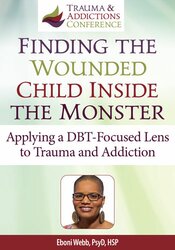DBT Foundations and Fundamentals
- 7 assumptions of DBT to guide practice
- The Biosocial Theory underlying DBT
- Main goals and history as an evidence-based treatment
- Acceptance and change as core principles of DBT
- Balancing acceptance and change strategies
- Navigating and addressing contradictory perspectives
- DBT practice components (individual therapy, skills group, treatment teams, phone coaching)
- The role of validation to build a therapeutic alliance
- Manage Treatment Interfering Behaviors (TIBs)
- Reviewing the 4 modules of DBT
- Research, limitations and treatment risks
DBT Assessment Tools to Determine Clients’ Needs
- Using the SUDs Scale to measure the intensity of emotional distress
- Behavioral Chain Analysis to identify triggers and gain insights into problematic behaviors
- How Diary Cards help you gain a better understanding of patterns
- Using the Emotion Identification Chart to improve emotional awareness
Mindfulness: Transform Clients’ Inner Dialogue, Cultivate Self-Awareness and Build Resilience
- Techniques to challenge and reframe self-critical beliefs
- Accessing and engaging “wise mind” in decision making and problem solving
- Cultivating acceptance and letting go of self-judgment and criticism
- Increasing awareness of judgmental thoughts and attitudes
- One Mindful: fully engage in the present moment without distraction
- Cultivating mindfulness as a tool for reducing impulsivity
- Pocket Mindfulness: brief exercises to manage stress and regulate emotions
Distress Tolerance: Practical Techniques to Manage Distress and Shift Perspectives
- Practical techniques to manage distress in the moment
- Engaging the 5 senses to ground oneself and manage distress
- Making lemonade from lemons - Shifting perspectives and reframing situations
- Tweaking our self-talk/coping thoughts- Changing negative self-talk and developing self compassion
- Radical Acceptance - Learning to accept and tolerate distressing situations without judgment or resistance
Mastering Emotions: Skills for Emotional Awareness, Regulation, and Coping
- Exercises to enhance emotional awareness and recognition
- The connection between emotions and physical sensations
- Opposite action skill to change emotional responses
- Checking the facts skill to challenge emotional assumptions and biases with evidence
- Developing adaptive coping strategies and analyzing behavior patterns
Interpersonal Effectiveness: Skills for Building Positive Connections, Communicating Effectively, and Setting Boundaries
- Identifying strengths and weaknesses in interpersonal effectiveness
- Emotional bank account -strategies to build and maintain positive emotional connections with others
- Using the DEARMAN technique for effective communication
- Assertive skills for saying “No” and setting boundaries
- Identifying and overcoming common barriers to effective interpersonal skills
Suicide Risk Assessment and Intervention Using DBT Tools
- Columbia Suicide Severity Rating Scale (C-SSRS)
- SAFE-T Pocket Card: Suicide Assessment Five-Step Evaluation and Triage for Clinicians
- Implementing evidence-based suicide prevention strategies
- Utilizing DBT tools to intervene with individuals at risk of suicide
- Developing a comprehensive safety plan to prevent suicidal behavior
- Providing ongoing support and follow-up care for individuals at risk of suicide
Trauma-Informed Care and Specialized Applications of DBT
- Strategies for creating a trauma-informed environment in DBT
- Adapting DBT skills modules for trauma treatment
- Specific DBT skills exercises for trauma-focused group settings
- Adapting DBT for adolescents
- DBT with clients who have SUD, eating disorders or co-occurring conditions
- Managing therapist burnout and self-care in DBT
Running a DBT Skills Group: A Step-by- Step Guide to Planning, Structuring, and Facilitating Effective Group Sessions
- Goals and objectives of DBT Skills Groups
- Structuring and conducting group sessions
- Tips for managing group dynamics and promoting a positive group culture
- Strategies for dealing with challenging group members and maintaining group cohesion
- How to monitor progress and evaluate outcomes in DBT Skills Group
Case Studies and Demonstrations
- Demonstrative role plays for applying DBT skills in therapy sessions
- Review of case studies and real-life examples of using DBT in clinical practice
- Feedback for improving therapist competency in DBT











